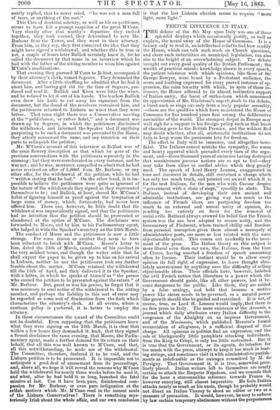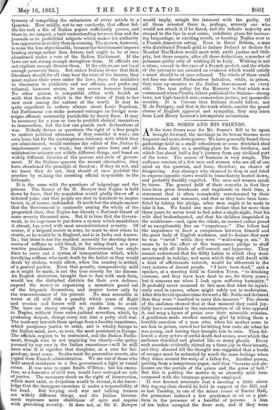FRENCH INFLUENCE IN ITALY.
THE debate of the 8th May upon Italy was one of those splendid displays which occasionally justify, as well as explain, the moral sway of the House of Commons. It is a luxury only to read it, an intellectual relief to feel how readily the House, which can talk such trash on Church questions, and cheer such imbecilities on municipal legislation, can also rise to the height of an overwhelming subject. The debate brought out every good quality of the British Parliament; the wealth of practical minute knowledge shown in every speech,. the patient tolerance with which opinions, like those of Sit'. George Bowyer, were heard by a Protestant audience, the- scorn and loathing expressed for every proved instance of op- pression, the calm tenacity with which, in spite of those in- stances, the House adhered to its almost instinctive support: of Italian unity, the burst of enthusiasm which announced its appreciation of Mr. Gladstone's superbfina/e to the debate, a burst such as rings out only from a truly popular assembly, —these are the qualities which have maintained the House of Commons for five hundred years first among the deliberative
assemblies of the world. The strongest despot in Europe may sigh for a support to his foreign policy such as that burst
-
of cheering gave to the British Premier, and the wildest Red may doubt whether, after all, aristocratic institutions do not help to keep warm the passionate lore for freedom.
The effect in Italy will be immense, and altogether bene- ficial. The Italians cannot mistake the sympathy, the warm: and hearty approval which pervaded every turn of the argu- ment, and—three thousand years of eminence having destroyed that sensitiveness parvenu nations are so apt to feel—they may take from allies so cordial advice which they greatly- need. The speech of Lord Henry Lennox, exaggerated in tone and incorrect in details, still contained a charge which- has only too much truth, and pointed out an evil which it is for the best Italians, for the men who with Cavour despise "government with a state of siege," speedily to abate. The Italians, instead of developing their own ancient and' admirable institutions, are giving way too much to the influence of French ideas, are postponing freedom too much to an external and unreal unity of opinion, de- pending too entirely on force for the removal a- social evils. Rattazzi always avowed his belief that the French system was the one best adapted to secure unity, and the bureaucracy of Piedmont, whose trained ability and freedom from personal corruption gives them almost a monopoly of administrative posts, are more or less tainted with the same objectionable spirit. This comes out markedly in the treat- ment of the press. The Italian theory on this subject is more liberal even than our own, the Italians, from the time of Cicero, haying asserted a freedom of speech amounting- often to licence. Their instinct would be to allow every opinion its full right of expression, to leave thought abso- lutely unrestrained by anything save the difficulty of selling objectionable ideas. Their officials have, however, imbibed the evil French notion that literature is a power which the Government should guide, like all other powers, lest it be-- come dangerous to the public. Like them, they are misled by a false analogy, and hold that because a motive- power like steam needs to be governed, so a natural power like growth should also be guided and restrained. It is not, of course, true, as Lord H. Lennox would imply, that there is- no free press in Italy. The mere existence of the Armenia, a journal which daily attributes every Italian difficulty to the vengeance of the Almighty on an impious Government, and of the Movimento, which published Mazzini's formal renunciation of allegiance, is a sufficient disproof of that charge. All opinions in politics find an expression, and the sale of blackguardly little pamphlets attacking individuals, from the King to Crispi, is only too little restrained. But it is true that the Government, or its agents, do interfere far too much with the press, attempt to keep it too much in lead- ing strings, and sometimes visit it with administrative punish- ments as indefensible as the outrages committed by M. de Persigny. That Government is, it is true, somewhat pecu- liarly placed. Italian writers left to themselves are nearly certain to attack the Emperor Napoleon, and we concede that. for the hour a statesmanlike reticence towards France.1s, however annoying, still almost imperative. He feels Italian. attacks nearly as much as his uncle, though he probably would not direct an Italian Viceroy to shoot an editor or two as a. measure of precaution. It would, however, be easy to enforce by law certain temporary abstinences without the preposterous, tyranny of compelling the submission of every article to a Qurestor. How mildly, not to say carelessly, that officer ful- fils his task a file of Italian papers sufficiently proves, and there is, we suspect, a tacit understanding between him and the journals as to prohibited subjects which makes his authority less oppressive in reality than in seeming. The system, however, is none the less objectionable, because the Government imposes leading strings rather than fetters, and ought to be at once abandoned under a vote of the Italian Parliament. If the laws are not strong enough strengthen them. If officials are not vigilant enough dismiss them. If the edit3rs are not loyal enough prosecute them. But unless Italians desire that their literature should for all time bear the taint of the bureau, they must replace their press under the laws, leave the initiative in discussion to publicists and not officials, and prefer any tribunal, however severe, to any censor however lenient. No other system is compatible either with health or with that freedom which is the first claim of Italy to her new rank among the nations of the world. It may be quite expedient to enforce silence about Louis Napoleon, but Parliament can make personal outrages on foreign sove- reigns offences summarily punishable by heavy fines. It may be necessary for a year or two to prohibit clerical incentives to insurrection, but the law can punish such declarations of war. Nobody denies or questions the right of a free people to restrict political utterance, if they consider it wise ; our own laws, but for the contemptuous leniency with which they are administered, would sentence the editor of the .Nation to imprisonment once a week ; but strict press laws and ad- 3-ninistrative seizures are widely different things, and based on widely different theories of the powers and ends of govern- ment. If the Italians approve the second alternative, they have abandoned the principle of freedom ; if they do not, and we know they do not, they should at once prohibit the practice by making the arresting official responsible to the tribunals.
It is the same with the questions of brigandage and the prisons. The theory of Sir G. Bowyer that Naples is held down by force, that the population would gladly throw off a detested yoke, and that people are shot in hundreds to inspire terror, is, of course, unfounded. It needs but the simple answer that the Government is anxiously arming the whole of the propertied class, that Naples has already a National Guard of some seventy thousand men. But it is true that the Govern- ment, in its eagerness to put down a system which scandalizes it abroad, has acted with most unconstitutional severity. Of course, if a brigand resists in arms, he must be shot where he stands, as he would be in England, and is in India and Austra- lia; but there is not the smallest necessity for shooting down scores of ruffians in cold blood, or for using death as a pre- ventive punishment. The Italian Government has ample force to carry out a system of transportation which, while terrifying ruffians who meet death by the bullet as they would death by cholera, would allow, when the country is settled, of a general pardon. Even that penalty, comparatively mild as it might be made, is not the true remedy for the disease. An English statesman, brought face to face with such facts, would tax the disturbed districts for their own defence, expend the money in organizing a mountain guard out 4of the brigands themselves, and inspire terror only by
the remorselessness of his pursuit. No man accessible to terror at all will risk a penalty which years of flight -and evasion and harass will not enable him to avoid. The laws are strong enough to put down crime even in Naples, without these extra-judicial severities, which, by producing despair, change every riot into a petty civil war. The tendency towards them springs from a Jacobin impatience, which postpones justice to order, and is wholly foreign to the Italian mind, now, as ever, the most persistent in Europe. The officials require to be restrained, and the Italian Parlia- ment, though wise in not inquiring too closely—the policy pursued by our own in the Indian executions—will be still more wise if it signifies that slaughter, as a cure for bri- gandage, must cease. So also must the preventive arrests, also copied from French administration. We are not of those who hold armed resistance to a free government a light or venial crime. It was wise to spare Smith O'Brien ; but his execu- tion, as a fomenter of civil war, would have outraged no rule of justice. The necessary check on the right of insurrection, -which must exist, or despotism would be eternal, is the know- ledge that the insurgent exercises it under a responsibility of his head. But levying civil war and talking treason are widely different things, and the Italian Govern- ment represses mere ebullitions of spite and caprice with provoking severity. It does not, as Sir G. Bowyer
would imply, mingle the innocent with the guilty. Of all those arrested there is, perhaps, scarcely one who would not attack it if he dared, and the infinite majority are steeped to the lips in real crime, indefinite plans for increas. ing brigandage, or exciting revolt, or handing Naples over to a French-American satrap. Even in Great Britain, a man who distributed French gold to induce Ireland to declare for Marshal MacMahon would meet with swift justice and little pity, but there remain, after all these deductions, a number of prisoners guilty only of wishing ill to Italy. Wishing is not a crime, except in the eyes of a French prefect, and the whole of the prisoners not arrested on evidence which would satisfy a court should be at once released. The whole of them could not face one decent Piedmontese battalion, while, in prison, they raise up enemies to the Italian Government on every side. The true policy for the Ministry is that which was commenced when Charles Albert published the Statuto— strong laws, not high-handed acts ; remorseless justice, not spasmodic severity. It is Cavour that Italians should follow, not M. de Persigny, and that is the truth which, amidst the grand chorus of English approval and sympathy, they may learn from Lord Henry Lennox's intemperate accusations.































 Previous page
Previous page